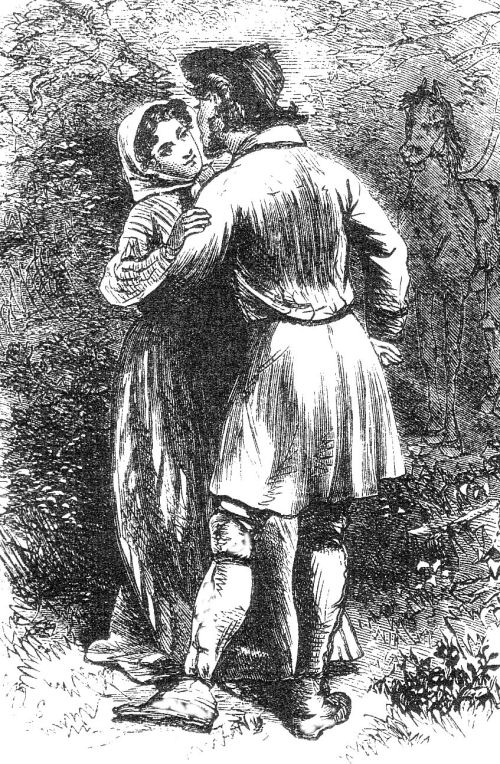|
The case of the Scottish rogue
By Diane Rapaport
“Rogue” sounds quaintly comic to the modern
ear, a seldom-used word more likely to provoke laughter than
indignation. In seventeenth-century New England, however, calling
someone a “rogue” was no joke. “Rogue” meant liar, villain or thief, and
it was the worst sort of insult, liable to trigger a fistfight or a
slander suit. Accused rogues often wound up explaining themselves to a
judge or jury, and the old court records reveal amusing – and sometimes
shocking – details of life in long-ago New England. One case from
colonial New Haven offers a particularly colorful glimpse into the bawdy
culture of an ironworks village, where Scotsman Patrick Morran feuded
with the Pinion family.
When Patrick first arrived in Massachusetts
with a shipload of Scottish war prisoners in 1652, he occupied one of
the lowest rungs on the Puritan social ladder, little better than a
slave. Sold to Oliver Purchase, clerk of the Hammersmith ironworks in
Lynn, Patrick became acquainted with the family of carpenter Nicholas
Pinion. Nicholas was no gentleman – his penchant for drunken violence
often landed him in court – but he worked for wages at Hammersmith and
had enough clout to “rent” Scotsmen from the ironworks company. By 1664,
Patrick and Nicholas found new work at a small forge along East Haven’s
Furnace Pond (today’s Lake Saltonstall in Connecticut). The move brought
a curious role reversal for the two men. Patrick had earned his freedom
and was beginning a career as clerk/paymaster of the East Haven
ironworks, his astonishing good fortune probably due to literacy,
bookkeeping skills and good relations with his former master. Nicholas
and his family now found themselves uncomfortably subordinate to
Patrick, forced to take their orders, and wages, from a former Scottish
servant.
Soon the Pinion women were calling Patrick a
“Scotch rogue,” but whether he deserved the epithet is difficult to
judge. The surviving court evidence suggests a Pinion vendetta against
the Scottish ironworks clerk, but Patrick’s own poor judgment surely
contributed to his legal troubles. Sorting out the truth was not easy
for the New Haven magistrates when Patrick went on trial in January
1665, accused by Elizabeth Pinion of “attempting to Violate the Chastity
of [her] two daughters.”

Fifteen-year-old Hannah Pinion furnished
lurid testimony. “One raynie day,” Patrick followed Hannah on an errand
and offered her a pair of gloves, “if she would come to the furnace with
him & let him ly with her.” Hannah rejected this proposition, telling
Patrick that she would not do what he asked “for many gloves.” Patrick
persisted, promising to wait for her at the ironworks and to leave a
signal on the furnace bridge. Three weeks later, Patrick allegedly tried
again, raising the stakes by offering Hannah gloves plus a pair
of stockings, his new signal to be “a great stone…upon the black stumpe
by the house.” She still refused. When Hannah went to Patrick’s room one
Friday night – purportedly to ask him for a pound of sugar – he
sweetened the offer of gloves with a silver shilling, too, if she would
lie with him. Apparently sure of success this time, he brandished the
shilling, took her in his arms and flung her on the bed, but she
threatened “if he would not be quiet she would call out to the folke
below, & soe he set her downe again.”
Elizabeth Pinion supported her daughter’s
testimony, recounting several times when she sent Hannah to the company
store for items such as gloves, stockings, liquor, or sugar, and Hannah
returned home empty-handed. Patrick would not dispense these goods,
Hannah told her, unless he could “have the use of her body in an
uncleane way."
Ruth Moore, Hannah’s older sister, also
testified. When she learned from Hannah “how Patricke inticed her,” Ruth
arranged to stop by the forge on one of the appointed nights herself,
taking the precaution of asking neighbor Thomas Luddington to follow
her, to witness what might happen. Ruth found Patrick standing at the
shop door by the furnace bridge, and after some teasing banter, she
accepted his invitation to “drinke a dramm of the bottle.” Then he
invited Ruth into the shop, making such “immodest & shamefull”
suggestions that Ruth was “ashamed to speake [of] it” in court.
According to Ruth, only Luddington’s arrival on the scene prevented
Patrick from taking improper advantage.
When the next witness took the stand,
however, the case against Patrick began to unravel. Nicholas Pinion
spoke in surprisingly neutral terms, for a father whose daughters
claimed to be the victims of unwanted sexual advances. Nicholas
emphasized that he had no complaint against Patrick – in fact, he had
discouraged his wife’s lawsuit – and he described a congenial
relationship with Patrick as drinking partner and visitor to their home.
Thomas Luddington did not exactly corroborate Ruth’s testimony, either,
when his turn came to testify. Although Thomas tried to follow Ruth to
the forge, she hurried on ahead, and halfway there he found Patrick
escorting Ruth “homeward.” Patrick expressed concern about being seen
“with this woman…of such an ill report,” and he asked Thomas not to
“make it knowne, for it would be a scandall to the gospell & a Blemish
to his name.”
The judges finally asked Patrick for his
side of the story, and he insisted that he was innocent. He denied
offering Hannah gloves or silver, leaving signals, or making “any such
attempt” on her honor. He admitted asking Ruth to visit the forge on the
night in question, but only to talk with her on behalf of a jilted
friend who felt that “she had done him wrong.” Goody Pinion and her
daughters falsely accused him, Patrick believed, because “he would not
let the old woman have soe much Commodities as she desired.” He
testified about one occasion, when he refused to give Elizabeth the blue
linen she demanded (apparently because she had overextended her credit
at the company store). She “abused him with her tongue & tooke up an
axe…& called him Scotch dog & Scotch Rogue & said she would knocke him
downe.”
Questioned by the judges about the
axe-wielding incident, Elizabeth confessed that it was true. The Court
had heard enough, and ruled in Patrick’s favor – he was “not…such a
person as they accuse him to bee” – but the verdict stopped short of
exoneration. Patrick “hath imprudently carried it,” the Court declared,
which “renders him suspitious of something of the like nature.”
Not content to walk away with a lukewarm
victory, Patrick filed a slander suit against the Pinion women, seeking
the enormous sum of £200. When the judges asked Patrick the basis for
his large damage claim, he pointed out that the Pinions had ruined his
good name, and that “he esteemed his name above…money.” The Court’s arch
response, “that he might over Esteeme his name,” did not bode well for a
huge recovery. Patrick won his case – he proved defamation – but the
award was a paltry £5, with fifty shillings for court costs.
Patrick’s tangled relations with the Pinion
family continued to keep the courts busy. A Pinion son broke into
Patrick’s cellar storehouse, vandalizing the ironworks ledger book and
stealing rum, sugar, stockings and gunpowder. Patrick scuffled with
Nicholas at the forge, and Elizabeth stole the Scotsman’s blanket.
Patrick successfully deflected new accusations of “unsutable &
unseasonable familiarity” with Hannah, and of sexual relations with Ruth
(who was hanged in Hartford for infanticide and adultery!), but the
judges warned him to be “wary…of being in privacy with such persons as
those.” Death threats in 1671 finally convinced Patrick to quit the East
Haven job. He returned to Massachusetts, reduced to low-level work as
another man’s servant.
Patrick’s troubles did not end with the
Pinions out of his life. By 1672, he provoked Massachusetts women to
call him “a naughty man” and accuse him of harassment, perhaps
validating old Goody Pinion’s assessment – that he was, indeed, a
“Scotch rogue.” Soon Patrick, as a soldier in King Philip’s War, was
fending off Indians instead of angry women, and he disappeared from
history.
Source
References
Franklin Bowditch Dexter, ed., Ancient
Town Records, Vol. II, New Haven Town Records 1662-1684 (New Haven:
New Haven Colony Historical Society, 1919), 99, 117-123, 148-151, 201,
204, 222-223, 275-276; George Francis Dow, ed., Records and Files of
the Quarterly Courts of Essex County, Massachusetts, (Salem, Mass.:
The Essex Institute, 1911-1921), 5:21-22, 8:305-306; George M. Bodge,
“Soldiers in King Philip’s War,” Register 37 (1883): 74. Bodge’s
book of the same name, first published in 1891, has been reprinted by
Genealogical Publishing Co. in book and CD formats.
For a different perspective on the Pinion
family, see Mary Beth Norton, Founding Mothers & Fathers (New
York: Alfred A. Knopf, 1996), 27-38.
 Diane
Rapaport is a former trial lawyer who has made a new career as a writer,
historian and genealogist. One of her special interests is the
little-known story of Scottish war prisoners exiled to the American
colonies in the mid 1600s. She has spent years tracing the fate of these
Scotsmen, and her articles have appeared in
New England Ancestors, The Highlander,
History Scotland and other publications. Her forthcoming book,
New England Court Records: A Research Guide for Genealogists and
Historians, will be published by the New England Historic
Genealogical Society. Diane’s e-mail address is
rapaports@aol.com. Diane
Rapaport is a former trial lawyer who has made a new career as a writer,
historian and genealogist. One of her special interests is the
little-known story of Scottish war prisoners exiled to the American
colonies in the mid 1600s. She has spent years tracing the fate of these
Scotsmen, and her articles have appeared in
New England Ancestors, The Highlander,
History Scotland and other publications. Her forthcoming book,
New England Court Records: A Research Guide for Genealogists and
Historians, will be published by the New England Historic
Genealogical Society. Diane’s e-mail address is
rapaports@aol.com.
© 2004 Diane Rapaport - all rights reserved
Note: This article appeared in
the Holiday 2004 issue of New England
Ancestors magazine and is reprinted by permission of the New England
Historic Genealogical Society. (See Diane Rapaport, New
England Ancestors 5 (Holiday 2004): 57-58.) For more information
about New England Ancestors and the New England Historic
Genealogical Society, please visit
www.NewEnglandAncestors.org. |

